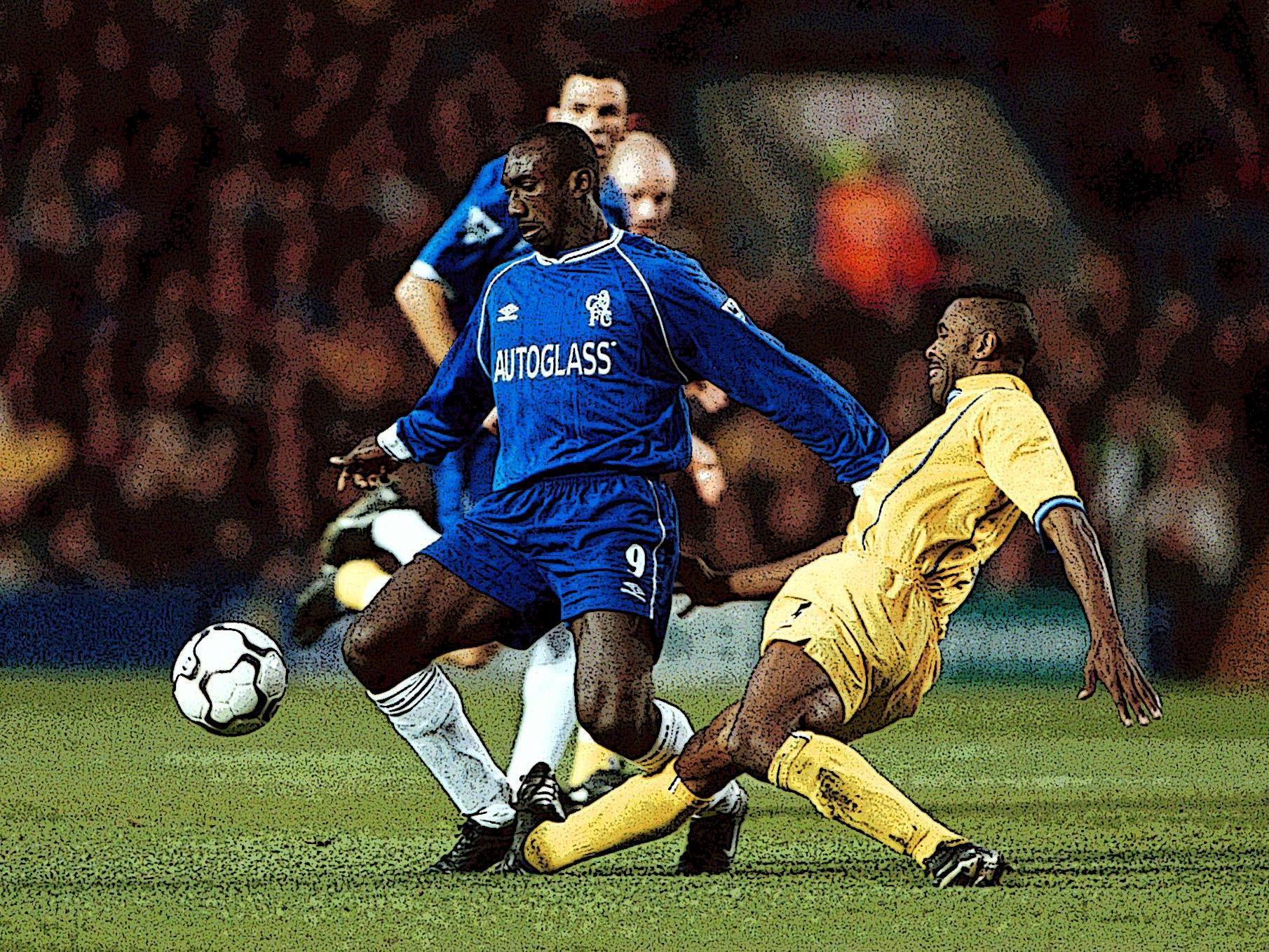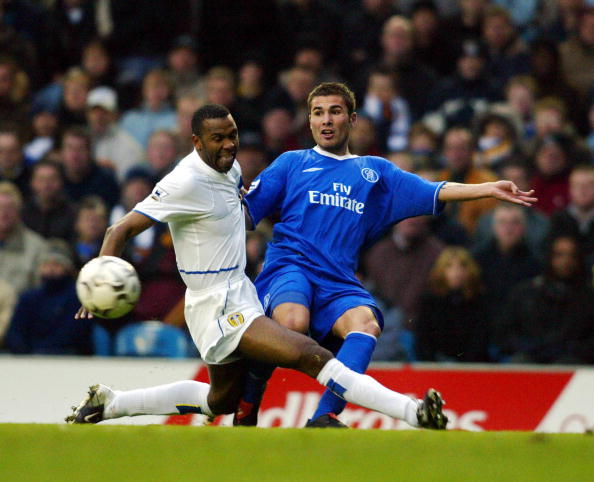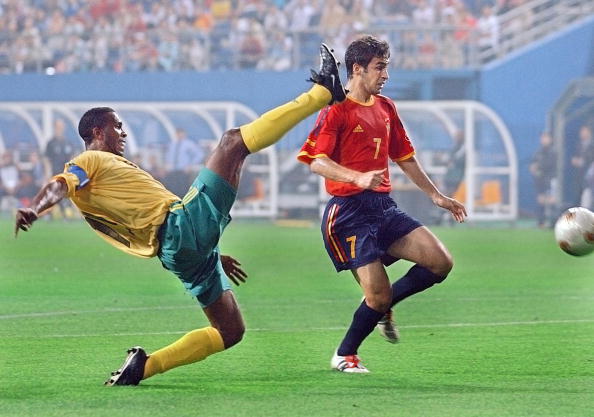The art of tackling: Lucas Radebe on shackling Thierry Henry and the secret to a perfect challenge
In the latest instalment of our series on football’s finer crafts, the former Leeds centre-back discusses the anticipation required to stifle Premier League strikers

Your support helps us to tell the story
From reproductive rights to climate change to Big Tech, The Independent is on the ground when the story is developing. Whether it's investigating the financials of Elon Musk's pro-Trump PAC or producing our latest documentary, 'The A Word', which shines a light on the American women fighting for reproductive rights, we know how important it is to parse out the facts from the messaging.
At such a critical moment in US history, we need reporters on the ground. Your donation allows us to keep sending journalists to speak to both sides of the story.
The Independent is trusted by Americans across the entire political spectrum. And unlike many other quality news outlets, we choose not to lock Americans out of our reporting and analysis with paywalls. We believe quality journalism should be available to everyone, paid for by those who can afford it.
Your support makes all the difference.Perhaps second only to a goal in the roar it can elicit from the stands, a firm, robust and well-timed tackle can swing the momentum of a football match; whether it’s a vital intervention to relieve the pressure on a besieged defence, or a clattering early challenge that galvanises an entire side and its supporters.
And there is a unique appreciation reserved among fans, particularly in British football, for players willing to put their bodies on the line in their efforts to recover the ball: crowds erupt for hotly contested 50-50 challenges and sliding tackles that crash through ball and opponent.
But the very best tacklers are distinguishable by their elegance. They do not rely on physicality alone. Instead, they prize precision over power and have a knack of always appearing to know their opponent’s next move.
“The most valuable skill in football – whether you’re a defender or a striker – is anticipation,” asserts former Leeds United centre-back Lucas Radebe. “You can avoid different situations by anticipating and making sure your timing is right.”
Radebe was one of the Premier League’s most revered defenders during his nine years with Leeds United in 1990s and early 2000s, possessing pace to match the strikers he shackled, commanding aerial power and a smoothness to his work that attracted interest from Manchester United and AC Milan in his prime.
“Coming to England, I was tackling more,” Radebe tells The Independent of his adaptation to English football following his move to Elland Road from Kaizer Chiefs in his native South Africa. “The wet pitches, the rain – I loved that. The game was fast. You had players who would take one touch and run; it was very quick. I had to make sure that whatever I did was to my advantage, and that’s where anticipation comes in.
“I learned to mark different players. With certain players, I knew that I couldn’t go to ground, I had to stay on my feet the whole time. People like Gianfranco Zola – you can’t really do a slide tackle against him. But with guys like [Thierry] Henry, it’s about knowing where and when [to make a sliding challenge].
“I used to enjoy it and I mastered it. Making a tackle without being rough or giving away a penalty, I really enjoyed that.”
There was a level of control and calmness to Radebe’s game that gave the impression there was no on-field scenario he had not seen and dealt with before. Already 25 when he moved to the Premier League, this assuredness, he suggests, came with experience.

“When you’re young you’ve got so much energy that you’ll make a lot of errors,” Radebe says. “But then you mature in the game. And you mature in your position, whereby you start thinking about doing things that aren’t taking a risk. That’s what I learned to do.
“For tackling in the box, your timing has to be right. I learned that and perfected that. It was something I had to do all the time, especially in a game. Up against a striker like Thierry Henry, who pushes the ball and runs, you’ve got to have the timing to know that once he touches the ball, you’re already anticipating his next move. Anticipation was most important. As you grow into the game, you become more successful with it.
“I had it, it was natural, but you have to perfect it in training. The way I played, that was the way I trained. One value that I had was that I wouldn’t use force. My attitude towards what I wanted to do was the same everywhere. Attitude was of great value. And that made me excel in the art of defending.”
Such a committed mindset was not the only psychological tool Radebe leant on to become one of the best defenders of his era. He would also employ visualisation techniques before every game, imbuing himself with confidence by picturing how he would thwart his opponents.
“You can’t always practise a lot in the field of play, but practise in your mind, play the game in your head. That’s what I used to do. Before a match, I knew who I was playing against and I would play the game first in my head before I entered the field of play. In my head, the headers are perfect, the tackles and the timing is perfect. Then I take that on to the field.

“One thing I tried to do and I did well was to get the centre-forward – especially when it was one-on-one – to touch the ball just before I make a tackle, just to make my decision and my timing easier. And I would go in with my lead leg before the player could touch the ball again, then if they manage to evade the lead leg, the other can come through and take the ball.”
Radebe retired from football in 2005, his final years at Leeds plagued by ankle, knee and Achilles injuries. The game has evolved in many ways since he quit playing, and he sympathises with the plight of the modern defender, as he feels tackling is an increasingly difficult skill to perfect.
“It has changed a lot. There are a lot of very skilful players now, very tactically and technically sound,” he says. “And the referees are stricter with the rules – sometimes a tackle from the side is considered a tackle from behind, and you have to be careful about leading with your studs up.
“There are a lot of players diving, which is tough for defenders. You can touch a player without intention and give away a free-kick or a penalty that can be costly. You can’t be strong and hard.”
It is often claimed that tackling is a dying art in the modern game, quelled by rule changes, refereeing directives and the gamesmanship of attacking players. But tackling will always have its place in football, it’s just that the brute force of old has been supplanted by the skills that set Radebe apart two decades ago: focus, anticipation and precision.

Join our commenting forum
Join thought-provoking conversations, follow other Independent readers and see their replies
Comments